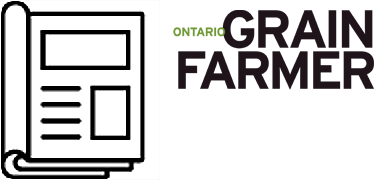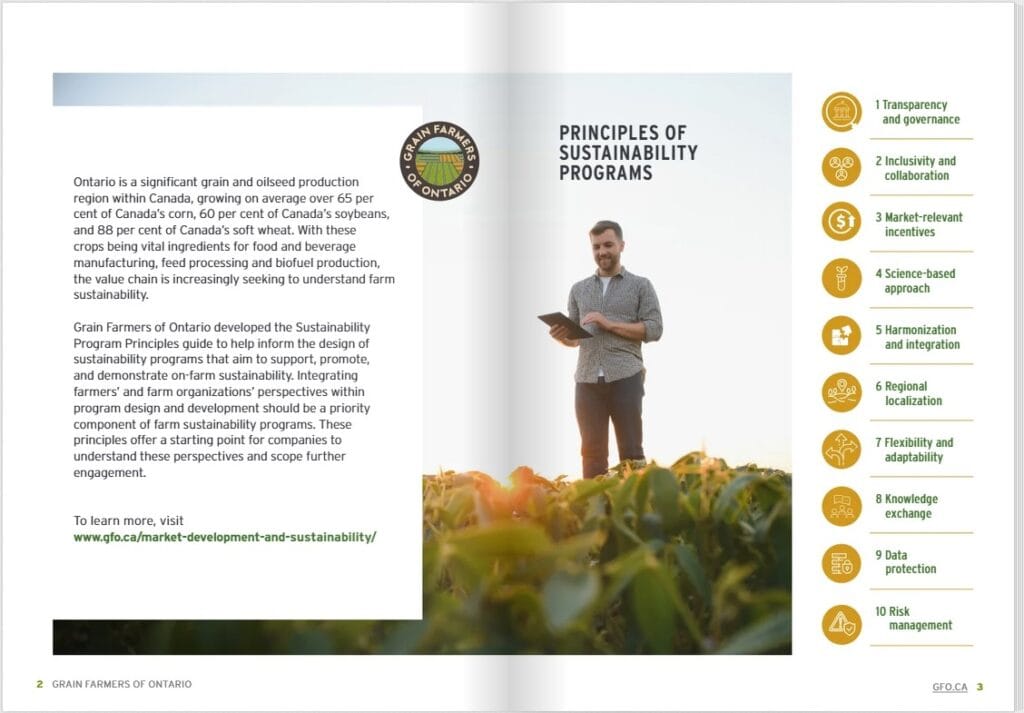
Sustainability in the Value Chain
Helping farmers navigate sustainability programs and communicate their achievements.
Corporate-led or value chain-driven sustainability programs aim to support, promote, and demonstrate on-farm sustainability.
Globally, agriculture and food companies are developing sustainability programs to build resiliency within their business, meet sustainability targets, and communicate environmental and social progress to stakeholders. The sustainability of an agri-food value chain starts with farmers and their approach to managing their operations. Moving along the value chain, each enterprise plays a role in advancing sustainability, from improving internal efficiency to setting targets for their operation’s progress.
Many farmers in Ontario participate in value chain sustainability programs, and Grain Farmers of Ontario is actively working on behalf of farmers to inform and improve the development and implementation of sustainability programs.
Sustainable value chain principles
Grain Farmers of Ontario developed the Sustainable Value Chain Program Principles to help inform the design of sustainability programs that aim to support, promote, and demonstrate on-farm sustainability. The growing interest in on-farm sustainability, coupled with the wide range of program design options, has led Grain Farmers of Ontario to draft these principles, which outline what companies should consider in their sustainability programs from a farm perspective. Integrating farmers’ and local organizations’ perspectives within program design and development should be a priority component of sustainability programs. These principles offer a starting point for companies to understand these perspectives and scope further engagement.
Farmers operate within complex systems and may face different limitations and opportunities. Recognizing this diversity among farmers and the land they manage when applying these principles will be critical in achieving sustainability outcomes valued by farmers and companies along the value chain.
Stakeholder engagement, field observations, and literature informed the drafting of the principles.
Key sustainability initiatives
Sustainable Agriculture Initiative (SAI)
SAI Platform brings together over 180 member companies and organizations to collaboratively develop tools and resources that enable the agriculture sector to advance sustainability globally.
Farm Sustainability Assessment (FSA) tool
- The SAI Platform led the development of the Farm Sustainability Assessment (FSA) tool, which is used by more than 400,000 farmers in over 60 countries and has been applied to over 180 agricultural crops.
- The FSA enables food and drink businesses to assess, improve, and validate on-farm sustainability in their supply chains through a comprehensive set of questions for farmers that can be easily customized to fit individual needs and local conditions while aligning with global market expectations.
- The FSA is free to use by anyone. Farmers, farm group managers, and buyers of agricultural ingredients can access a step-by-step guide to implementing the FSA.
Regenerating Together Program
- The Regenerating Together program offers a global definition of an aligned approach to regenerative agriculture that aims to mitigate and adapt to the impacts of climate change, improve soil health, support biodiversity, retain water in the soil while reducing its consumption, and improve farmers’ livelihoods now and into the future.
- The Regenerating Together program includes a global regenerative agriculture framework, outcome assessment and reporting process, and a transition support and implementation guidance document.
- This program was developed with industry, farmers, and academia to build alignment, minimize duplication, amplify collaboration, and support implementation.
Field to Market Canada
Field to Market Canada is a national multi-stakeholder initiative that enables the measurement and improvement of environmental outcomes related to agriculture.
National Indicator Report
- Published every four years, Field to Market’s National Indicators Report analyzes sustainability metrics focused on Canadian agriculture and the science-based measurements of outcomes associated with commodity crop production.
- The report provides information on the environmental sustainability of peas, lentils, spring wheat, winter wheat, durum wheat, canola, oats, flax and soybeans in Western Canada, and corn, soybeans and winter wheat in Ontario and Quebec.
Canadian Fieldprint Calculator
- The Canadian Fieldprint Calculator is an Excel-based tool that requires basic information on farming practices, soils, and climate to model a crop’s estimated sustainability based on four indicators: Land Use Efficiency, Energy Use, Greenhouse Gas Emissions, and Soil Erosion Risk.
4R Nutrient Stewardship Strategy
The purpose of the Ontario 4R Nutrient Stewardship Program between Fertilizer Canada, Ontario Agri Business Association, Ontario Ministry of Agriculture, Food and Rural Affairs, Grain Farmers of Ontario, Ontario Federation of Agriculture, and Christian Farmers Federation of Ontario regarding:
- The implementation of Fertilizer Canada’s voluntary nutrient stewardship initiative in Ontario, known as the 4R Nutrient Stewardship Certification program. The 4R Nutrient Stewardship Certification Program is unique to Ontario and works to verify 4R acres in Ontario.
- Adapting the program’s best management practices to Ontario’s agricultural production systems and unique regional climatic, soil, and operational conditions to ensure that it is effective.
Ontario’s 4R Nutrient Stewardship Certification Program
- This program is voluntary and designed to enable agri-retailers in Ontario to integrate the principles of 4R Nutrient Stewardship (Right Source at the Right Rate, Right Time, Right Place®1) into their business and recommendations, which is verified by a third-party organization based on auditable standards.
Sustainable Canadian Soy program
- The Sustainable Canadian Soy program is a voluntary stewardship program that drives new market opportunities, ensures continued access to premium markets, and enhances the sustainability of Canadian farms and the soybean value chain. The program covers sustainability topics, including land use efficiency, climate-smart farming, soil health, water stewardship, biodiversity, and habitat.
- This is a voluntary, market-driven program that will ensure continued access to premium markets and create new market opportunities for the soybean value chain. Customers of Canadian value-added soybeans have asked for a verifiable sustainability program, and the Sustainable Canadian Soy Program enables Canada’s soybean industry to compete for market share on an international level. The program will also help farmers assess their soybean production methods and encourage further adoption of sustainable farming practices.
- Sustainable Canadian Soy utilizes the Farm Sustainability Assessment (FSA), a globally recognized whole-farm sustainability benchmarking and assessment program. It will be managed by participating Canadian grain exporters and handlers who serve customers who are asking for sustainability verification.
International Sustainability and Carbon Certifications (ISCC)
The ISCC is a global sustainable certification system that covers sustainable feedstocks for biofuels and sustainable aviation fuels, including agriculture and forestry biomass, biogenic wastes and residues, circular materials, and renewables.
- ISCC hosts several certifications demonstrating sustainability attributes to meet market and policy demands. For example, ISCC EU is a certification that demonstrates compliance with sustainability criteria for biofuels and bioliquids under EU and United Kingdom policies, and ISCC CORSIA is a certification that can be used for sustainable aviation fuels to meet requirements under the ICAO CORSIA scheme.


